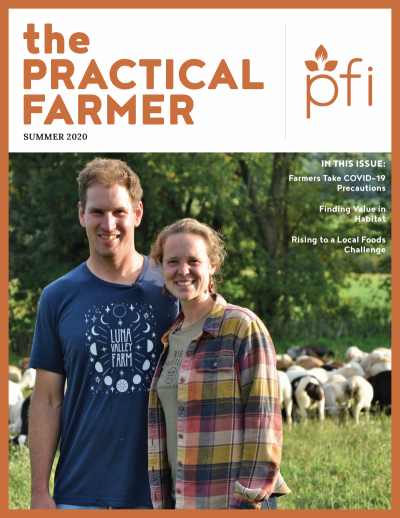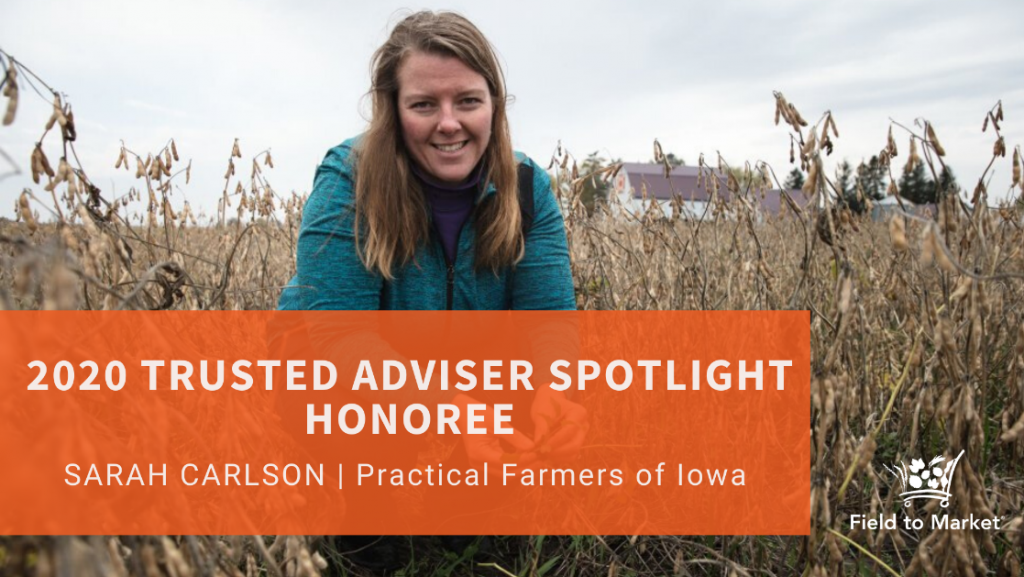the Practical Farmer: Summer 2020
Executive Director Note
Field Crops
Row-Crop Farmers Take Covid-19 Precautions
From employee conversations to contingency planning, farmers are taking the lead in being prepared during the pandemic.
Early PFI Members
Larry and Ruth Neppl have valued PFI’s culture of sharing since 1988.
Habitat
For landowner Jim Freeland, cultivating quality habitat is good for the landscape and for his finances.
Cooperators’ Program
Testing the Limits of Terminating Rye in Soybeans
Through on-farm research, PFI farmers seek ways to boost the financial and environmental benefits of cover crops.
PFI Leaders
A Growing Community of Support
Our supportive network of leaders and donors helps ensure we remain financially sustainable.
Community Resilience
Rising to a Local Foods Challenge
As COVID-19 has upended food supply chains, PFI farmers have rapidly shifted their businesses to serve more customers during a pandemic.
Infographic
PFI’s Cost-Share Programs
This informative visual illustrates how PFI’s cover crop and small grains cost-share programs work, how they’ve grown and where they operate.
Farm Transfer
Making Land Affordable for the Next Generation
Dale Nimrod and his siblings sold their southwest Iowa farm with community vitality, rather than top dollar, in mind.
Member Book Review
Review of: “Farming While Black”
PFI News
- PFI’s COVID-19 Practices and Precautions
- Meet Our New Strategic Initiatives Coordinator
- Sarah Carlson Honored as a Trusted Advisor
- Apply for Cover Crop Cost-Share
- Vital Conversations and Actions Toward Equity
- Summer Shirt Sale
- Read the Newest PFI Research
PFI’s COVID-19 Practices and Precautions
Safety and well-being of staff, members and the public remain our top priority
As the COVID-19 pandemic continues to spread across the U.S., including Iowa, we remain vigilant about the safety of our staff, our members, their families and the broader community. We are taking this pandemic very seriously, and also recognize that it has exposed a broader vulnerability within our farms and communities – that like everything else, they are susceptible to disruption from outside factors.
We remain committed to doing whatever we can to equip farmers to build resilient farms and communities that can weather any storm.
Here are some of the steps we’re taking as we continue to cope with the reality of COVID-19:
Monitoring COVID-19
We are following recommendations from departments of health, health officials and other health experts to guide our decisions related to COVID-19. Some vital resources include the World Health Organization, Centers for Disease Control and Prevention and the Iowa Department of Public Health.
One of our values as an organization is “welcoming everyone.” We recognize that this new virus is a bigger threat to some members of our community than others – and that scientific understanding continues to evolve about how the virus works and who is more susceptible. We believe it is our responsibility to structure our work to ensure everyone can safely participate in our programming.
Remote Work and Limited Office Access
The PFI office remains closed to the public until further notice. While our staff is mainly working from home, some staff need to come in periodically to take care of tasks that can’t be done remotely. We are handling this process with the utmost care.
We have structured our office time to limit how many staff members can be in the same space at the same time – office time is pre-scheduled (staff must receive permission to come in), and staff numbers are kept to a bare minimum. As spread of the virus lessens, we will take a phased approach to working more from the office.
Events
Until further notice, PFI will not participate in any indoor events, and will not participate in outdoor events with more than 10 people in attendance. As spread of the virus lessens, we will take a phased approach to resuming in-person participation at events.
In the interim, we will continue to hold virtual events on Facebook Live and Zoom. We spent much of April and May ensuring that these virtual events can be high-quality opportunities for farmers to share practical knowledge and to connect with each other.
For more information on our 2020 field day season, visit practicalfarmers.org/field-days. While we are disappointed to not have in-person events, we’re excited about the potential for these virtual events to make it possible for people around the state and beyond our border to participate.
Resumption of Some In-Person Meetings
PFI staff have begun meeting outdoors with each other and with members, with a few precautions to ensure the safety of everyone involved:
- These meetings are optional for everyone involved
- Masks are encouraged for all people at the meeting
- Six feet of distance is maintained between people
- Meetings to include no more than 10 people
- Staff are advised to avoid touching frequently used surfaces
- Staff cannot travel in vehicles with each other or other people
- None of the people at the meeting has COVID-19 symptoms
- None of the people at the meeting has known exposure to COVID-19 in the previous 14 days
COVID-19 and Agriculture
COVID-19 has made clear that our food system faces serious challenges. At PFI, we believe that a reliable, resilient local food and farming system is essential for the social and economic well-being of our communities. Our members have worked to build the local food and farming system since PFI’s inception, and we will continue to share their stories so more people can see what adaptability, flexibility and resilience look like.
Our board president, Wendy Johnson, wrote a letter to the editor to the Des Moines Register – “Now is the Time to Foster Resilient Farms and Communities” – that expresses how we feel.
PFI is well-positioned to lead the effort to strengthen our local food system; make our agriculture supply chains more resilient; and to make both work better for farmers and consumers alike. We believe that:
- Our food system is too clustered around very specific parts of our state and country
- Specialization makes sense, but when taken to the extreme it makes us more vulnerable to environmental, human health and political disruptions
- The pattern of consolidating meat processing into a few key places diverts money out of rural communities
- We need grain, fruit, vegetable and livestock production and processing spread across the landscape so that no single place is vulnerable
- A more broadly distributed food and farm system supports rural communities by ensuring the businesses and social institutions – like schools, hardware stores, equipment dealerships, churches, hospitals and restaurants – that support farm enterprises are also spread out
- We need to take seriously the old adage of “not having our eggs in one basket”
If you have questions about how PFI is responding to COVID-19, please contact Sally Worley at sally@practicalfarmers.org or (515) 232-5661.
Meet Our New Strategic Initiatives Coordinator
 Lydia English joined the PFI staff in the summer of 2020. She works with the strategic initiatives team to connect farmers with outreach opportunities, and she equips farmers with the resources they need to be effective advocates of cover crops and small grains. She also assists with on-farm variety trials and performs cover crop consultations.
Lydia English joined the PFI staff in the summer of 2020. She works with the strategic initiatives team to connect farmers with outreach opportunities, and she equips farmers with the resources they need to be effective advocates of cover crops and small grains. She also assists with on-farm variety trials and performs cover crop consultations.
Lydia graduated from Carleton College in Northfield, Minnesota, in 2013 with a Bachelor of Arts in biology. She then moved around a bit, working at the Chicago Botanic Garden, Seed Savers Exchange in Decorah, Iowa, and bakeries in Vermont and Minnesota, where she was spoiled with fresh bread and croissants.
In summer 2017, Lydia came to Ames to pursue her master’s degree at Iowa State University in sustainable agriculture and ecology and evolutionary biology – a dual focus that reflects her interest in combining the principles of ecology and agriculture to create diversified farming systems. For her thesis at ISU, she sampled the vegetation in prairie strips on 26 farms across Iowa. She continues to enjoy learning to identify new plants, and teaching others.
Lydia grew up in Providence, Rhode Island. She loves the Midwest but doesn’t forsake an opportunity to visit her family in the Ocean State and gorge on seafood. In her spare time, she enjoys cooking, knitting, being outdoors and thrifting.
Sarah Carlson Honored as a Trusted Advisor
Sarah Carlson has been recognized as part of Field to Market’s 2020 Trusted Adviser Spotlight Series! Through her role at PFI, Sarah works to support Iowa farmers in scaling their adoption of cover crops and other conservation practices that improve sustainability outcomes.
Field to Market recognized Sarah on June 24 during its annual Plenary and General Assembly Meeting, recognizing her outstanding leadership in implementing innovative approaches to scale conservation agriculture.
Congratulations to Sarah for her accomplishments in delivering sustainable outcomes for U.S. commodity agriculture!
Apply for Cover Crop Cost-Share
Do you sell soybeans to the Archer Daniels Midland (ADM) Des Moines supply chain or corn directly to Cargill at Eddyville, Iowa? If so, you might be eligible for cost-share to help make cover crops work on your farm. Determine your eligibility by completing the application at practicalfarmers.org/cover-crop-cost-share-programs, and we’ll let you know if you qualify.
Questions? Contact Chris Wilbeck at chris@practicalfarmers.org or (515) 232-5661.
Apply for Farm Aid Relief Payments
Practical Farmers is partnering with Farm Aid and Iowa Farmers Union to provide a limited amount of one-time $500 emergency relief payments to farm families.
Awards are intended as emergency relief for farmers and their families. Use of the funds is restricted to household expenses, such as groceries, home utilities, medical bills, counseling or other household expenses not directly related to the commercial operation of the farm or ranch.
Applications will be accepted on a rolling basis and reviewed weekly until funds run out.
Vital Conversations and Actions Toward Equity
Practical Farmers of Iowa’s mission is to equip farmers to build resilient farms and communities. We cannot achieve our mission without justice and equality for all.
Practical Farmers helps farmers by providing resources, education and a community of connections to help them succeed. To honor our value of welcoming everyone, we are working to be a more inclusive organization by reaching out to Black people, Indigenous people and other people of color.
We are working to create relationships with all Iowans who farm or aspire to farm, learning what challenges they face, what they need to be successful and welcoming them into PFI’s support network. Our network is resilient because of its diversity.
But we know there is more we must do to fight racism and inequality. As a staff, we plan to build awareness through staff training, and then ongoing action, to increase our focus on diversity, equity and inclusion within our organization.
Many of our members have already requested we increase our focus in these areas. During this time where racism is so visibly exposed to all of us through recent, but not isolated, racist acts, our big-tent philosophy stresses that we can all learn how to do better in acting against racism.
While they are tough conversations to have, conversations about our actions are vital on the path to equity in our communities and on our farms.
Summer Shirt Sale
If you’ve been thinking of purchasing a PFI shirt or adding to your collection, now is the time to stock up. We’ve discounted several Practical Farmers of Iowa shirts to 40% off in our online store – that’s just $9 a shirt! – while supplies last. These items feature our previous logo, and will not be restocked.
Read the Newest PFI Research
This summer, staff involved with PFI’s Cooperators’ Program published two new research reports:
- “Tea Bag Decomposition in Agroforestry and Crop Fields”: In this trial, Kathy Dice of Red Fern Farm buried black and green tea bags at six sites: four in diverse agroforestry sites; one in a wooded site; and one conventional crop field. Mass loss of the tea bags indicates decomposition due to the microbial activity and could serve as a proxy for soil health.
- “Economic and Soil Health Impact of Grazing Cover Crops, 2018-2019”: In this trial, Six cooperators, each integrated cattle-crop farmers, grazed cover crops in the fall, winter or spring, or both. To determine the economic and soil health impact of grazing cover crops, the cooperators kept cover crop and grazing records and had their soil sampled in May 2019.
To read these reports, and others conducted by farmers in our Cooperators’ Program, visit practicalfarmers.org/research.



